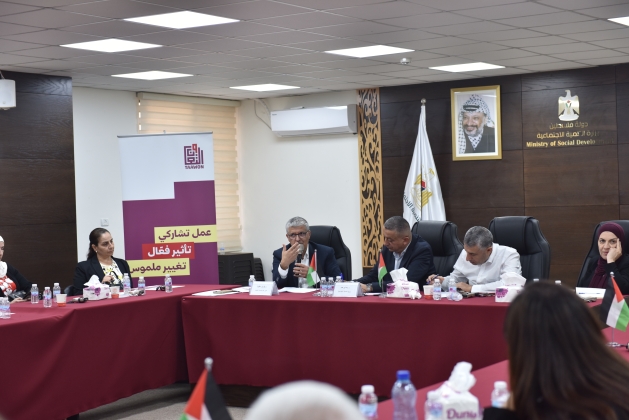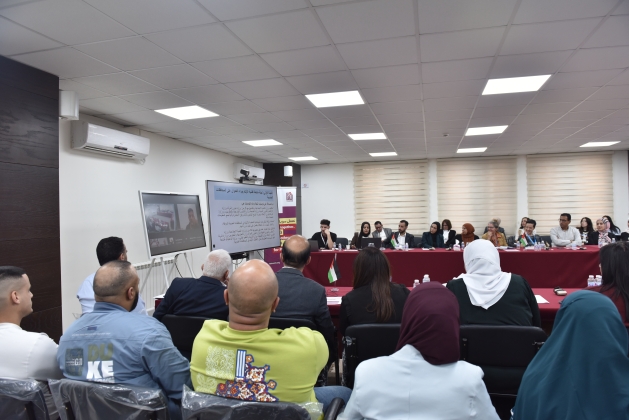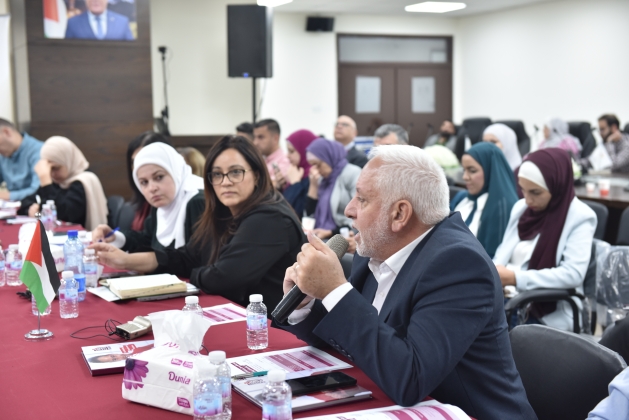Workshop on Building a Holistic System of Care for Orphans in the West Bank and Gaza Strip
Ramallah – November 10, 2025
The Ministry of Social Development, in partnership with Taawon, held a workshop titled “Building a Holistic System of Care for Orphans in the West Bank and Gaza Strip.” The event brought together representatives from national and international institutions and organizations working in the field of orphan care. It took place at the Ministry’s headquarters in Ramallah, with the participation of partners from Gaza joining virtually.
The workshop aimed to explore ways to develop a comprehensive and sustainable national system that ensures the protection of orphans’ rights and promotes their social inclusion within a development-based approach grounded in social justice and family empowerment. The program featured opening remarks by H.E. Dr. Samah Hamad, Minister of Social Development, and Dr. Tareq Emtairah, Director General of Taawon, in addition to presentations and studies highlighting the current situation of orphans in Palestine and the experiences of civil society and sectoral partners in this field.
In her address, Dr. Hamad emphasized the Ministry’s commitment to building an integrated national care system that strengthens social justice and unifies public and civil efforts to provide a safe and supportive environment for children. She noted that the aggression on Gaza has left over 69,000 martyrs and 170,000 injured, including around 57,000 orphaned children.
She added that the Ministry prioritizes the issue of orphans through Cabinet resolutions and social protection programs, and is working to link these efforts within the National Social Registry to ensure equitable targeting and service integration. The Ministry currently provides 18 core social services that cover protection, care, and empowerment for children, people with disabilities, the elderly, women, and vulnerable families.
Dr. Hamad expressed appreciation for Taawon’s partnership in developing a national framework for orphan care, highlighting ongoing coordination through the government’s emergency response operations room in the southern governorates, in cooperation with 47 national institutions. These collective efforts aim to move from relief to recovery and reconstruction while building a fair and sustainable social protection system that safeguards the dignity of every Palestinian.
In his remarks, Dr. Tareq Emtairah stated, “Taawon’s work with orphans is rooted in the belief that care goes beyond assistance. It is about empowering children and their families to build a better future. Our experience has shown that investing in education and psychosocial support is the most effective way to bring lasting change to their lives and communities.”
He added, “This workshop marks an important step toward establishing an integrated national system that brings together successful models and unifies visions among partners to ensure a dignified and equitable future for every Palestinian child.”
Taawon presented its developmental vision through the NOOR initiative as a leading model for holistic orphan care in Gaza. The program focuses on empowering orphaned children and their families through education, psychosocial and health support, and life-skills development. The organization explained that its developmental approach shifts from direct financial aid toward investing in human potential and building self-reliance, creating a sustainable model that reinforces resilience and dignity.
The workshop also featured an overview of the NOOR portal, which serves as an integrated data system for documenting children’s progress across educational, psychological, and social dimensions. The platform connects partner organizations under a unified information management system that promotes transparency, efficiency, and service coordination.
The workshop concluded with a set of recommendations, including the establishment of a national committee comprising representatives from civil society, government, and the private sector to lead the development of a sustainable national system for orphan care, particularly in Gaza. It also called for the creation of a standing coordination committee to hold regular meetings, update data, and align partner efforts.
Participants emphasized the need for a structured mechanism for data sharing among institutions while protecting privacy and confidentiality, as well as the development of a technical manual defining case management standards and intervention procedures. They recommended the establishment of a unified national database overseen by the Ministry of Social Development and linked to an accessible digital platform that facilitates data exchange, transparency, and coordination.
The recommendations further stressed the importance of addressing the psychological and social well-being of orphans alongside material support, developing long-term plans that ensure sustainability, and meeting the needs of children at every stage of life. They also called for empowering women heads of households, creating tailored interventions for orphans with disabilities, and ensuring family stability for children under foster care. The session concluded with a call for greater alignment among donors and partners under a unified national vision that promotes equity and sustainability in orphan care across Palestine.
This workshop is part of a series of joint efforts between the Ministry of Social Development and Taawon to strengthen an integrated social protection system for orphaned children in Palestine, aligned with national priorities and sustainable development goals.



